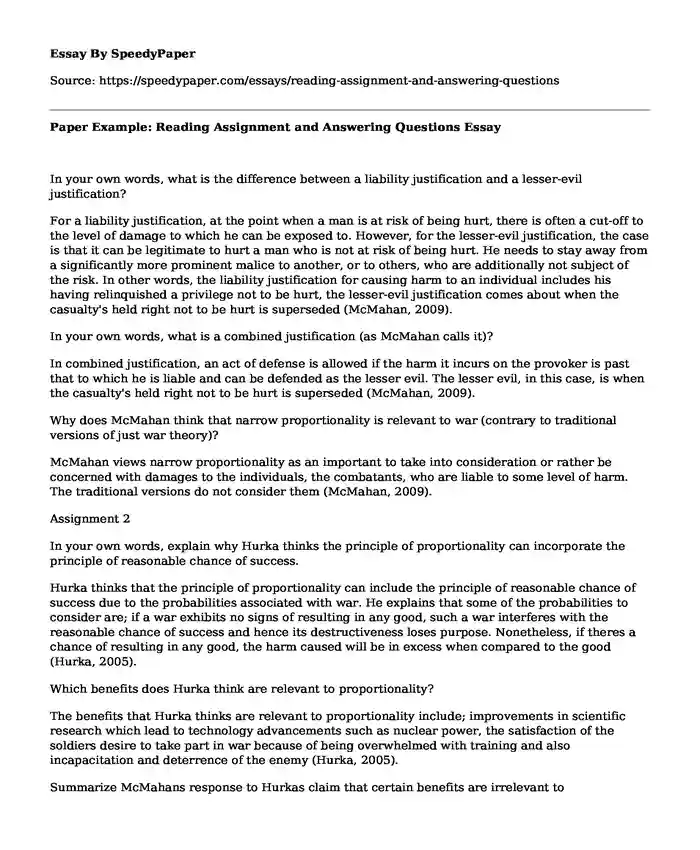
| Type of paper: | Essay |
| Categories: | Philosophy War |
| Pages: | 3 |
| Wordcount: | 618 words |
In your own words, what is the difference between a liability justification and a lesser-evil justification?
For a liability justification, at the point when a man is at risk of being hurt, there is often a cut-off to the level of damage to which he can be exposed to. However, for the lesser-evil justification, the case is that it can be legitimate to hurt a man who is not at risk of being hurt. He needs to stay away from a significantly more prominent malice to another, or to others, who are additionally not subject of the risk. In other words, the liability justification for causing harm to an individual includes his having relinquished a privilege not to be hurt, the lesser-evil justification comes about when the casualty's held right not to be hurt is superseded (McMahan, 2009).
In your own words, what is a combined justification (as McMahan calls it)?
In combined justification, an act of defense is allowed if the harm it incurs on the provoker is past that to which he is liable and can be defended as the lesser evil. The lesser evil, in this case, is when the casualty's held right not to be hurt is superseded (McMahan, 2009).
Why does McMahan think that narrow proportionality is relevant to war (contrary to traditional versions of just war theory)?
McMahan views narrow proportionality as an important to take into consideration or rather be concerned with damages to the individuals, the combatants, who are liable to some level of harm. The traditional versions do not consider them (McMahan, 2009).
Assignment 2
In your own words, explain why Hurka thinks the principle of proportionality can incorporate the principle of reasonable chance of success.
Hurka thinks that the principle of proportionality can include the principle of reasonable chance of success due to the probabilities associated with war. He explains that some of the probabilities to consider are; if a war exhibits no signs of resulting in any good, such a war interferes with the reasonable chance of success and hence its destructiveness loses purpose. Nonetheless, if theres a chance of resulting in any good, the harm caused will be in excess when compared to the good (Hurka, 2005).
Which benefits does Hurka think are relevant to proportionality?
The benefits that Hurka thinks are relevant to proportionality include; improvements in scientific research which lead to technology advancements such as nuclear power, the satisfaction of the soldiers desire to take part in war because of being overwhelmed with training and also incapacitation and deterrence of the enemy (Hurka, 2005).
Summarize McMahans response to Hurkas claim that certain benefits are irrelevant to proportionality.
McMahan explains that Hurkas claim that certain benefits are irrelevant to proportionality is as a result of failing to distinguish between narrow and wide proportionality. According to McMahan, the existence of a single proportionality constraint that had equal share on harms towards provokers and harms experienced by innocent civilians, then the harms imposed to the invaders that have unjust purposes in an unfair combat would weigh less when compared to the harm inflicted on the civilian population. However, a distinction between narrow and wide proportionality, the harms imposed on the unjust soldiers can be considered in the narrow proportionality but taking into considerations the liability of the soldiers (McMahan, 2009).
Which harms does Hurka think are relevant to proportionality?
The harms that Hurka thinks are relevant to proportionality include; economic harms caused by a country being attacked, interference of scientific analysis, causing harm to the soldiers and also possibly, one war being the end of all wars (Hurka, 2005).
References
Hurka, T. (2005). Proportionality in the Morality of War. Philosophy and Public Affairs, 1, 1-33.
McMahan, J. (2009). Killing in war. New York: Oxford University Press.
Cite this page
Paper Example: Reading Assignment and Answering Questions. (2019, Nov 08). Retrieved from https://speedypaper.net/essays/reading-assignment-and-answering-questions
Request Removal
If you are the original author of this essay and no longer wish to have it published on the SpeedyPaper website, please click below to request its removal:
- HRM Essay Sample: The Importance of Work-Related Co-Curricular Activities
- Personal Experience Essay Sample: An Embarrassing Moment at School
- Psychology Essay Example: Attachment and Systems Perspective on Loss
- Free Essay on Modern American History - The March of the Flag
- Business Ethics Essay Example: Who am I?
- Mandatory Public and Military Service. Paper Example
- Free Paper Sample on Gender Roles and Stereotypes
Popular categories




